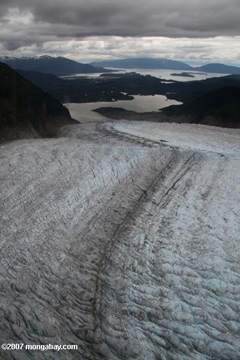Future Ice Age Put on the Back Burner
Future Ice Age Put on the Back Burner
Joshua S Hill, special to mongabay.com
August 30, 2007
|
|
Dr Toby Tyrrell of the University of Southampton’s School of Ocean and Earth Science at the National Oceanography Centre, Southampton has published a report in the latest edition of New Scientist magazine laying out his research that future ice-ages — an evolutionary imperative for the planet earth — could be pushed back some half a million years.
Using a mathematical model, Tyrrell and his team focused on how marine chemistry will be affected by rising carbon dioxide levels from fossil fuel use. The levels in oceans are such that they are reducing the availability of calcium carbonate ions, making it more difficult for surface-dwelling marine organisms to form structural shells.
The study done by Tyrrell’s team is part-funded by the Natural Environment Research Council and backs up earlier research done by David Archer of the University of Chicago, who was among the first to suggest that rising CO2 would affect further ice-ages.
 Photo by Rhett A. Butler |
“Our research shows why atmospheric CO2 will not return to pre-industrial levels after we stop burning fossil fuels. It shows that it if we use up all known fossil fuels it doesn’t matter at what rate we burn them. The result would be the same if we burned them at present rates or at more moderate rates; we would still get the same eventual ice-age-prevention result.”
Ice-age generally occur every 100,000 years or so and play an important role is shaping Earth’s surface. During an ice age, glaciers make their way slowly down close to the equator, and upon their retreat millions of years later, leave behind fertile soil for those species that survived.
This idea is also picked up in a book by Alan Weisman entitled The World Without Us, where he discussed how long it would take for the planet’s oceans to reach a state of normality. The general consensus from both Tyrrell and Weisman seems to be that the damage we have perpetrated on the planet has irrevocably damaged the normal cycle, the ebb and flow, of glacial movement.